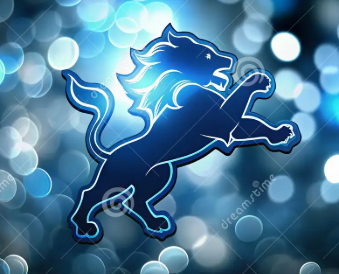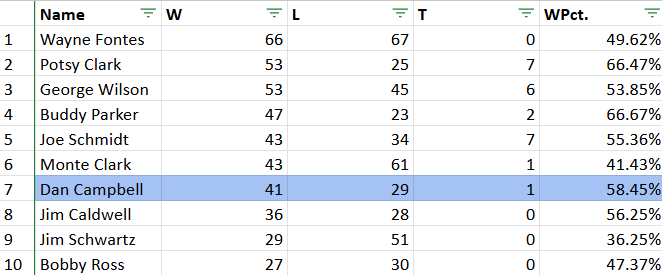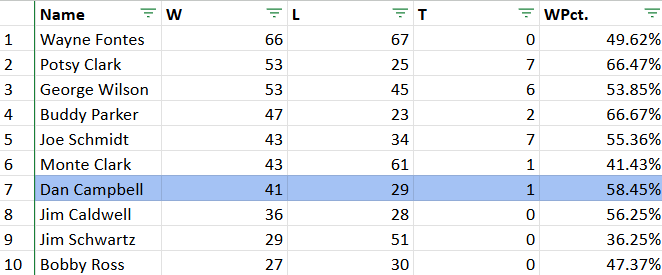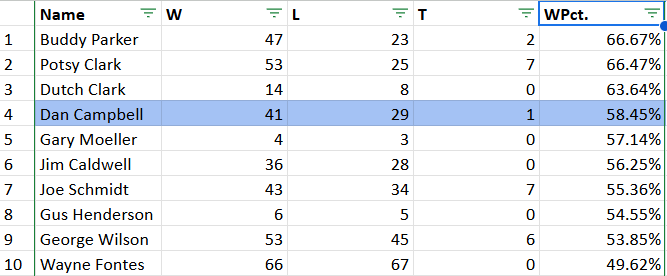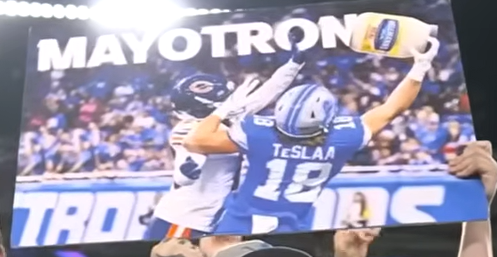-
Posts
2,498 -
Joined
-
Last visited
-
Days Won
6
Content Type
Profiles
Forums
Events
Blogs
Store
Articles
Everything posted by RedRamage
-
During the attempt to not injure himself, Swift probably injured himself.
-
Nope, but you seem to think that I think that the ending HAS to be climatic. It doesn't. I've already said that.
-
Here's one of those weird trivia question: The Lions have had 29 different people leading them as HC in games (this include intern head coaches and Robert Prince, who was temporary HC for one game because of Covid quarantine from other coaches). Of those 29 coaches, what percentage would you guess had the last name Clark?
-
We're starting to get down an argument of semantics. I didn't watch the game itself, but from what I've read it absolutely was entertaining, so I agree with you there. Something can be entertaining with an anti-climatic ending... which I guess is what I was trying to get at. Ties are anti-climatic by nature. Fans, generally, want one team or the other to win. But the 70 minutes between the start and the anti-climatic ending can be entertaining. So no need to device (imho) non-entertaining football to ensure that the rare anti-climatic ending doesn't happen.
-
I don't love ties in the NFL, but I also don't want a bunch of "non-football rules" put in places to try and avoid them... like I don't want each team to start at the 20 and need to score and need to go for two points or whatever. So I get what you're saying here about not adding stupid rules. That said, I think a tie is very anti-climatic. Not one wants a tie, no one is rooting for a game to end in a tie. Ties just feel weird and unfulfilling. But that's okay. It's alright that it can have an unfulfilling feeling. They're rare enough that I don't think we need to jump through hoops to avoid them, and the NFL has a way to deal with it in the standings, so that's not a problem either. Ties are unfulfilling, and that's okay.
-
I feel like someone went to an artist that specialized in making unicorns and said: "Hey, I love your unicorns! Can you make a Lions logo?" The artist was like: "Umm... I dunno, that's not really my thing." Client: "Here's $200" Artist: "Ok, sure!"
-
-

Week Three: Detroit Lions (1-1) @ Baltimore Ravens (1-1)
RedRamage replied to MichiganCardinal's topic in Detroit Lions
I heard someone once say that fans of mediocre teams are the ones who really life and die with the wins and losses of their teams, and I think that's pretty accurate. If your team is bad... well, who cares if they lose? It's to be expected. And if they win? Well, that's a fluke, not a sign of sudden turn around. If you're team is good, then wins are to be expected and losses can be tolerated because they're rare and you know your team will bounce back. It's only when your team is in the middle that each win or loss can mean the start of a trend and therefore has much more meaning. I ran @Sports_Freak's comments through ChatGPT and it said there's a 97.3% certainty that they were sarcastic. -
After yesterday's win, Dan Campbell now as a W/L/T record of: 41/29/1... which is good for a 58.45% winning percentage. In terms of total wins Campbell is 7th all time in Detroit Lions History: Campbell needs just three more wins to move into 5th place, 7 more (very much doable this season) will put him in the top 4. As for winning percentage, Campbell is already top 4: In case anyone is curious, there have been 21 head coaches in Detroit Lions history if you count Potsy Clark only once and you include Robert Prince. Potsy had two different stints as Lions Head Coach: From 1931-1936, and then again in 1940. Robert Prince coached only one game as the Lions Head Coach. He served as acting Head Coach in 2020 due to interim head coach Darrell Bevell (among other Lions coaching staff members) being in quarantine because of COVID exposure. The Lions lost that game, meaning Prince as a winning percentage of 0.00%. Sadly, he's not the only Lions head coach with that record. John Karcis was hired by the Lions as a backfield coach under Bill Edwards in 1942, and was elevated to head coach after the Lions lost their first three games of the season. Owner Mandel fired Edwards and two of his assistants, and named Karcis Head Coach. Karcis would lose all remaining 8 games in that season.
-

Week Three: Detroit Lions (1-1) @ Baltimore Ravens (1-1)
RedRamage replied to MichiganCardinal's topic in Detroit Lions
Grok is wrong. -

Week Three: Detroit Lions (1-1) @ Baltimore Ravens (1-1)
RedRamage replied to MichiganCardinal's topic in Detroit Lions
My thing is to do my utmost to leave the emotions in the game itself... especially when they lose. I have a distinct memory a handful of years ago, after yet another Lions loss, of thinking: "Wait, if the Lions had won... would I be super giddy excited and feel like my whole week was made? No? Then why am I letting a lose make me ultra grumpy and pissed off and taking it out on my family?" So now I let myself feel whatever emotion I want during the game, but then when the game is over I remind myself that a loss means nothing real and tangible to my life. -

Week Three: Detroit Lions (1-1) @ Baltimore Ravens (1-1)
RedRamage replied to MichiganCardinal's topic in Detroit Lions
Some of it can be explained as emotions in the moment. I don't usually post much during the game, but I'm certainly shouted stuff at my TV as I'm sure we all have. I've always hijacked the Las Vegas catchphrase: "What's said during the game stays as 'during the game.'" That said, it is possible to go a little too far in a gameday thread. -

Week Three: Detroit Lions (1-1) @ Baltimore Ravens (1-1)
RedRamage replied to MichiganCardinal's topic in Detroit Lions
-

Week Three: Detroit Lions (1-1) @ Baltimore Ravens (1-1)
RedRamage replied to MichiganCardinal's topic in Detroit Lions
I noticed that as well. I think a lot more of this stuff happens that the average fans doesn't really pick up on. I only noticed this because it happened like three or fours times in short order before the 4th down play. -

Week Three: Detroit Lions (1-1) @ Baltimore Ravens (1-1)
RedRamage replied to MichiganCardinal's topic in Detroit Lions
Honestly I think it wasn't that much of a snub or anything... The Lions played horrible against the Pack. They beat up the Bears, but... it was the Bears. Then the Ravens are a great team with SB aspirations as well and it was a road game for the Lions. I can't find too much fault in the talking heads picking the Ravens. -

Week Three: Detroit Lions (1-1) @ Baltimore Ravens (1-1)
RedRamage replied to MichiganCardinal's topic in Detroit Lions
Ehhh... I dunno. I don't know if I can ever view SOL as a positive. I totally get what you're saying here and I appreciate it, but when the initials are SOL it's always gonna be a negative thing for me. -

Week Three: Detroit Lions (1-1) @ Baltimore Ravens (1-1)
RedRamage replied to MichiganCardinal's topic in Detroit Lions
Yeah, the way the game started on the ground was not encouraging, but they certainly produced by the end of it! -

Week Three: Detroit Lions (1-1) @ Baltimore Ravens (1-1)
RedRamage replied to MichiganCardinal's topic in Detroit Lions
Stupid coaches... -

Week Three: Detroit Lions (1-1) @ Baltimore Ravens (1-1)
RedRamage replied to MichiganCardinal's topic in Detroit Lions
Oh yeah, they absolutely can. I was worried that the Lions were going to be out classed by the Ravens, but they've hung with them and shown that they are every bit as good a team. -

Week Three: Detroit Lions (1-1) @ Baltimore Ravens (1-1)
RedRamage replied to MichiganCardinal's topic in Detroit Lions
Not that I want to be "that guy," but it seemed like we had a number of bad calls/non-calls... The helmet to helmet on Goff, the "hold" on the punt, which didn't look like a hold at all to me, a non-call on a pretty obvious hold on Anzalone. -

Week Three: Detroit Lions (1-1) @ Baltimore Ravens (1-1)
RedRamage replied to MichiganCardinal's topic in Detroit Lions
I actually am surprised. Because this isn't season ending IR... just out for like 4 weeks or so. The fact that they aren't ruling out him coming back is very surprising. -

Week Two: Chicago Bears (0-1) @ Detroit Lions (0-1)
RedRamage replied to MichiganCardinal's topic in Detroit Lions
I'd be okay with that. I mean, I'd rather a full TV crew so that replays would sync and all that, but if the only option would radio synced up I'd be okay with it. And yes I know that technically I could just play radio audio while watching TV, but it's not quite the same and means I'd be stuck with going back to watching live instead of being able to do it on tape delay and fast forwarding through commercials. -

Week Two: Chicago Bears (0-1) @ Detroit Lions (0-1)
RedRamage replied to MichiganCardinal's topic in Detroit Lions
One more thing I forgot to mention from yesterdays game: I did NOT like St. Brown's TD celebration. I'm sorry if all you young whippersnappers thought it was funny or cute or whatever. But let me tell you straight up: It was NOT funny. It was NOT cute. I mean crap man... my heart can't take stuff like that! For the love of all us older guys who are in horrible shape are just one greasy hamburger away from the heart attack... do NOT do something like that again! -

Week Two: Chicago Bears (0-1) @ Detroit Lions (0-1)
RedRamage replied to MichiganCardinal's topic in Detroit Lions
-

Week Two: Chicago Bears (0-1) @ Detroit Lions (0-1)
RedRamage replied to MichiganCardinal's topic in Detroit Lions
I know it would cost more, which is why it'll never happen. But I also think it would be well within the NFL's budget to handle it. If they can do it for MLB they can do it for NFL. It helps now that the Lions are better. But I'm sure we all clearly remember the years when the Lions were the red-headed step-child that no one cared about and we'd get the same cliched stories (did you know that Stafford and Kershaw were on the same team in highschool?!?!?), wrong names, and bad information from the announcers, etc. I don't want the announcers to be complete homers, but I also wouldn't mind a Detroit focused announcer team who'll at least have accurate information about the players I care about and won't repeat the sale old tired crap all the time.


